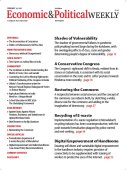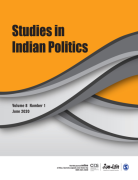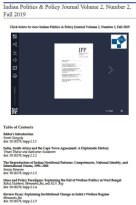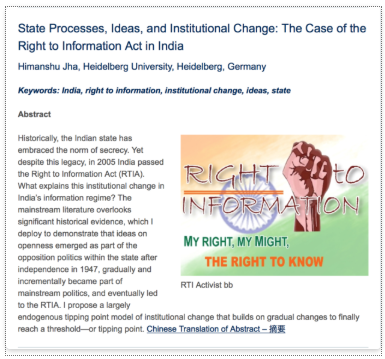Politics of Climate Change and Welfare
2023
Tanvi Deshpande, Rahul Mukherji and Mekhala Sastry "Policy Styles and India's National Action Plan on Climate Change (NAPCC)" in Policy Studies. |
||
|
Tanvi Deshpande, Rahul Mukherji and Mekhala Sastry published an article "Policy styles and India's national action plan on climate change (NAPCC)" in Policy Studies. Read the article here.
|
||
2022
Rahul Mukherji and Himanshu Jha "India and Bangladesh in Global Financial Governance: From Structural Conflict to Embedded Liberalism in the Climate Finance Regime," in Joost Pauwelyn, Martino Maggetti, Tim Büthe, and Ayelet Berman, eds., Rethinking Participation in Global Governance (Oxford University Press, 2022). |
||
|
Prof Dr. Rahul Mukherji and Dr. Himanshu Jha have published a chapter titled “India and Bangladesh in Global Financial Governance: From Structural Conflict to Embedded Liberalism in the Climate Finance Regime”, in a recently published edited book by Joost Pauwelyn, Martino Maggetti, Tim Büthe, and Ayelet Berman on Rethinking Participation in Global Governance by Oxford University Press. Read the chapter here.
|
||
2021
Pralay Kanungo and Sitaram Kumbhar, "Odisha’s Transformation under the Naveen Patnaik Regime," Economic & Political Weekly, vol. 56, No. 8, (Feb, 2021). |
||
|
Pralay Kanungo and Sitaram Kumbhar have published an article on "Odisha’s Transformation under the Naveen Patnaik Regime," in the Economic & Political Weekly, vol. 56, No. 8, (Feb, 2021). Read the article here.
|
||
2020
Himanshu Jha, Capturing Institutional Change: the case of the Right to Information Act in India, (Oxford University Press: New Delhi, 2020). |
||
|
Himanshu Jha published a book “Capturing Institutional Change: the case of the Right to Information Act in India” by Oxford University Press. The first book in the Institutions and Development in South Asia series, this volume studies the information regime in India from an alternative historical institutional perspective. Read the book details here.
|
||
Rahul Mukherji and Seyed Hossein Zarhani, “Governing India: Evolution of Programmatic Welfare in Andhra Pradesh,” Studies in Indian Politics, Vol.8, No.1 (June 2020): 7-21. |
||
|
Prof. Rahul Mukherji and Dr. Seyed Hossein Zarhani have co-authored an article on "Governing India: Evolution of Programmatic Welfare in Andhra Pradesh" in the journal, Studies in Indian Politics (Vol. 8 Issue. 1). Read the article here. |
||
2019
Rahul Mukherji and Himanshu Jha and Manab N. Roy, “Ideas and Policy Paradigms: Explaining the Fall of Welfare Politics in West Bengal,” Indian Politics & Policy, Vol.2, No.2 (2019). |
||
|
Prof. Rahul Mukherji, Dr. Himanshu Jha and Dr. M.N.Roy have co-authored an article on “Ideas and Policy Paradigms: Explaining the Fall of Welfare Politics in West Bengal” in the latest issue of Indian Politics & Policy Journal. In this issue, Dr. Himanshu Jha has published a review article as well on “Explaining Institutional Change in India’s Welfare Regime”. Articles can be accessed here. |
||
Himanshu Jha, “Emerging Politics of Accountability: Sub-national Reflections from Bihar”, in Madhushree Sekher and Radu Carciumaru, eds. Including the Excluded in South Asia, (Singapore: Springer, 2019). |
||
|
|
Dr. Himanshu Jha has published a chapter titled ‘Emerging Politics of Accountability: Sub-national Reflections from Bihar’, In a recently published edited book by Madhushree Sekher and Radu Carciumaru on ‘Including the Excluded in South Asia’ published by Springer, Singapore. Access the chapter here. |
|
Rahul Mukherji and Himanshu Jha, “The State, Social Policy and Welfare: Reflections on Andhra Pradesh and West Bengal” in Vidhu Verma, The State in India: Ideas, Norms and Politics, (New Delhi: Orient Blackswan, 2019). |
||
|
|
The chapter examines some of the conditions under which the state is likely to be more capable in delivering welfare results. It argues that ideas held within the bureaucracy are as important as the political will to support such proposals. Ideas and competence within the technocracy matter, as much as the political support for governance projects. This framework is then applied to welfare provisioning in two comparable cases.The first was the successful implementation of the Mahatma Gandhi National Rural Employment Guarantee Scheme (MGNREGS) in undivided Andhra Pradesh. The second is the relative failure of the state in West Bengal to implement the same program in the early years. The edited book offers an insightful overview of the literature on the state and showcases the interplay of state and society in new sites: processes of globalisation, assertions of sovereignty, and across the regional and local. The volume moves beyond the state question to interrogate how the state can shape concepts, ideas, and institutions central to our lives. The rise of the welfare state with extensive social policies of affirmative action and the emerging penal state are some of the core themes of the volume. |
|
2018
Rahul Mukherji and Seyed Hossein Zarhani and Kopulla Raju, “State Capacity and Welfare Politics in India: Implementing the Mahatma Gandhi National Rural Employment Guarantee Scheme in Undivided Andhra Pradesh”, Indian Journal of Human Development, Vol. 12, No. 2 (2018). |
||
|
|
The article "State Capacity and Welfare Politics in India: Implementing the Mahatma Gandhi National Rural Employment Guarantee Scheme in Undivided Andhra Pradesh" by Mukherji/Zarhani/Raju argues that the Indian state can develop the capacity to deliver economic rights in a citizen-friendly way, despite serious challenges posed by patronage politics and clientelism. Clientelistic politics reveals why the Indian state fails to deliver the basic rights such as the right to work, health and education. We argue that the ability of the state to deliver owes a lot to bureaucratic puzzling and political powering over developmental ideas in a path-dependent way. The article was published in the Indian Journal of Human Development. See details here. |
|
Himanshu Jha, “State Processes, Ideas, and Institutional Change: The Case of the Right to Information Act in India”, Pacific Affairs, Vol. 91, No. 2 (2018). |
||
|
|
Historically, the Indian state has embraced the norm of secrecy. Yet despite this legacy, in 2005 India passed the Right to Information Act (RTIA). What explains this institutional change in India’s information regime? The mainstream literature overlooks significant historical evidence, which I deploy to demonstrate that ideas on openness emerged as part of the opposition politics within the state after independence in 1947, gradually and incrementally became part of mainstream politics, and eventually led to the RTIA. I propose a largely endogenous model of institutional change that builds on gradual changes to finally reach a threshold—or tipping point. The article is available here. |
|
Himanshu Jha, “Emerging Politics of Accountability: Institutional Progression of the Right to Information Act”, Economic & Political Weekly, Vol. 53, No.10 (2018): 47–53. |
|
|
|
The implementation of the Right to Information Act, 2005 in Bihar is studied to examine the progression and deepening of institutional change. The institutional progression is inextricably linked to change in the political regime and the resultant shifts in policy priorities. The RTI Act has opened up a new space for accountability between state and society, its use is often linked to local politics, and a new form of elite agency has emerged, whose practitioners this article categorises as “agents of accountability.” These agents are different from the category of elite agency discussed in scholarly literature, such as the “expansive elite,” pyraveekars, gaon ka neta, “political fixers,” or naya netas. The article is available here. |
2017
Rahul Mukherji and Himanshu Jha, “Bureaucratic Rationality, Political Will, and State Capacity - MGNREGS in Undivided Andhra Pradesh”, Economic & Political Weekly, Vol. 52, No.49 (2017): 53–60. |
|
|
|
The successful implementation of the Mahatma Gandhi National Rural Employment Guarantee Scheme in undivided Andhra Pradesh underlines the triumph of citizen formation over patron-client politics, aided by a democratic politics. This article argues that its success in Andhra Pradesh depended heavily on how the ideas within the rural development bureaucracy interacted with the political executive. This synergy engendered a state’s capacity to insulate a committed bureaucracy from powerful farmers and construction companies who had a clear interest in thwarting the programme. Elections can in a democracy elevate citizen concern over particularistic populism, when political will is matched by ideational conviction in the bureaucracy. The article is available here. |
Bernhard Beitelmair-Berini, Theorizing Indian Strategic Culture(s): Taking Stock of a Controversial Debate, in Mischa Hansel, Raphaelle Khan and Melissa Levaillant, Theorizing India’s Foreign Policy, (New York and London: Routledge, 2017). |
|
|
The book "Theorizing India’s Foreign Policy” recently published by Routledge, has a chapter by Bernhard Beitelmair-Berini (PhD researcher and lecturer at the Department of Political Science of the SAI) on “Theorizing Indian Strategic Culture(s): Taking Stock of a Controversial Debate“. The chapter by Bernhard Beitelmair-Berini takes issue with the popular notion of a strategic culture deficit in India. He argues that at least four strategic subcultures compete with each other in Indian foreign policy discourses: Nehruvian, Liberal Globalist, Leftists and Hindu Revivalist. These schools of thinking originate from, (re)interpret and/or mix a vast array of ancient, pre- and post-independence intellectual sources. This chapter ultimately highlights the need to foster a discussion between the social sciences and the humanities, particularly literature and language studies, in order to theorise traditions of strategic thought on India. “Theorizing Indian Foreign Policy” draws together the study of contemporary Indian foreign policy. For more information please click here. |
|



















